
Anuari de Filologia-Estudis de Linguistica
metrics 2024
Fostering collaboration in the study of language.
Introduction
Anuari de Filologia-Estudis de Lingüística is a prominent open-access journal published by the University of Barcelona, dedicated to advancing the study of linguistics and philology. Since its establishment, the journal has become a vital platform for scholars and researchers interested in the intricate dynamics of language, embracing various linguistic fields and methodologies. With its Open Access model initiated in 2011, Anuari de Filologia ensures that cutting-edge research is accessible to a global audience, bridging gaps in knowledge and fostering collaboration. The journal’s commitment to excellence is reflected in its rigorous peer-review process and engagement with contemporary linguistic issues. This makes it an essential resource for academics, professionals, and students aiming to deepen their understanding of linguistic theories and practices in an increasingly interconnected world.
Metrics 2024
 -
- 0.20
0.20 0.30
0.30 -
-Metrics History
Rank 2024
JCI (Web Of Science)
Quartile History
Similar Journals

Studia z Filologii Polskiej i Slowianskiej
Pioneering Research in Slavic Linguistic PhenomenaStudia z Filologii Polskiej i Slowianskiej is a prominent journal published by the Polish Academy of Sciences, Institute of Slavic Studies, focusing on the rich and diverse field of linguistics and language studies, particularly within the Slavic context. With the ISSN 0081-7090 and E-ISSN 2392-2435, this open-access journal has been a valuable resource for researchers, professionals, and students since its transition to an open-access model in 2014. It features rigorous peer-reviewed articles that contribute to the understanding of linguistic phenomena and cultural narratives across Slavic languages. Recognized within the Q3 quartile of linguistics and language in 2023, it ranks at the intersection of arts, humanities, and social sciences, providing insights that echo through disciplines such as sociolinguistics, psycholinguistics, and philology. In its ongoing publication trajectory from 2011 to 2023, Studia z Filologii Polskiej i Slowianskiej continues to foster academic discourse and collaboration, positioning itself as a key player in the global linguistic community.

DEUTSCHE SPRACHE
Connecting Scholars through German Language ResearchDEUTSCHE SPRACHE, published by Erich Schmidt Verlag, is a pivotal journal dedicated to the intricate study of the German language. With its ISSN 0340-9341 and E-ISSN 1866-5233, this publication serves as a vital resource for linguists, educators, and language enthusiasts alike. Spanning diverse topics within the fields of linguistics and language, psychology, and social sciences, the journal has earned a Q3 ranking in Linguistics and Language, alongside a Q4 ranking in both Psychology (miscellaneous) and Social Sciences (miscellaneous) as of 2023. Although the journal is not Open Access, it provides invaluable insights on the developments in German language research from its convergence years of 2002 to 2011 and 2017 to 2023. Positioned in Berlin-Tiergarten, Germany, DEUTSCHE SPRACHE continues to expand its influence and accessibility to researchers, professionals, and students keen on understanding the nuances of linguistic expression in the German language.
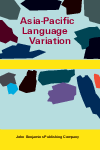
Asia-Pacific Language Variation
Analyzing the Dynamic Spectrum of Asia-Pacific LanguagesAsia-Pacific Language Variation is a prominent scholarly journal published by John Benjamins Publishing Co, dedicated to the exploration and analysis of linguistic diversity across the Asia-Pacific region. With its ISSN 2215-1354 and E-ISSN 2215-1362, the journal serves as a key resource for researchers and practitioners in the fields of linguistics and language studies. Since its inception in 2019, it has quickly ascended in stature, receiving a 2023 category quartile ranking of Q2 in Linguistics and Language and achieving impressive Scopus rankings, placing it in the 83rd percentile in Arts and Humanities and 81st in Social Sciences. Through its rigorous peer-reviewed articles, the journal aims to foster a deeper understanding of language variation, promoting interdisciplinary research and collaboration. Although it is not an open-access journal, the depth of research and critical insights offered in its pages make it an invaluable asset for academics, students, and professionals keen on the nuances of language within the dynamic Asia-Pacific context.
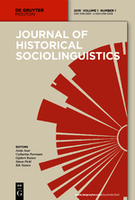
Journal of Historical Sociolinguistics
Decoding the Interplay of Language and Social FactorsThe Journal of Historical Sociolinguistics is a distinguished publication focusing on the intricate relationships between language and society from a historical perspective. Published by WALTER DE GRUYTER GMBH in Germany, this journal (ISSN: 2199-2894, E-ISSN: 2199-2908) is recognized for its rigorous scholarship, ranking in the Q2 quartile in Linguistics and Language (2023), highlighting its relevance and impact within the academic community. With Scopus rankings placing it at #326/1088 in Arts and Humanities and #386/1167 in Social Sciences, this journal is essential for researchers and scholars interested in the dynamics of language evolution, sociolinguistic shifts, and historical context. Through its insightful articles and contributions, the journal aims to illuminate the nuanced interplay between linguistic change and social factors over time, making it an invaluable resource for students, professionals, and academics alike. The journal operates under an open-access model, ensuring that knowledge is disseminated widely and freely accessible to those engaged in the cutting-edge studies of sociolinguistics.
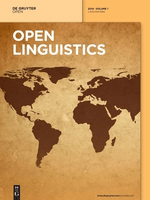
Open Linguistics
Innovating discourse in linguistics for a global audience.Open Linguistics is a premier open access journal dedicated to advancing the field of linguistics, published by DE GRUYTER POLAND SP Z O O. Since its inception in 2014, the journal has consistently provided a platform for innovative research and critical discourse in various subfields of linguistics. With an impressive Q1 ranking in the linguistics category as of 2023, Open Linguistics is recognized for its significant contributions, ranking #223 out of 1088 in Arts and Humanities, as well as achieving a commendable #260 out of 1167 in Social Sciences. The journal's open access policy ensures that research is freely accessible to both scholars and practitioners, fostering a collaborative and inclusive academic community. With a focus on original research, reviews, and theoretical papers, Open Linguistics is positioned as an essential resource for researchers, educators, and students seeking to deepen their understanding of language and its diverse applications in society.
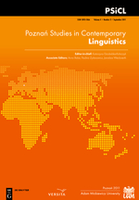
Poznan Studies in Contemporary Linguistics
Elevating linguistic insights for a global audience.Poznan Studies in Contemporary Linguistics, published by DE GRUYTER MOUTON, is a pivotal journal in the field of linguistics, with an ISSN of 0137-2459 and an E-ISSN of 1897-7499. Located in Germany, this esteemed journal has consistently contributed to the academic landscape since its inception. As of 2023, it holds a Q2 category rank in Linguistics and Language and boasts commendable Scopus rankings, featuring in the 69th percentile for Arts and Humanities and the 66th percentile for Social Sciences. The journal emerges as a vital platform for scholars to explore contemporary linguistic theories and practices, making it an essential resource for researchers, professionals, and students alike. With a converged publication period from 2007 to 2024, it aims to facilitate a deeper understanding of linguistic advancements and trends. While the journal currently does not offer open access, its rigorous peer-review process ensures the highest quality of published research, strengthening its role as a leading discourse in the dynamic field of linguistics.

RILCE-Revista de Filologia Hispanica
Exploring the Depths of Linguistic and Literary StudiesRILCE-Revista de Filologia Hispanica is a distinguished academic journal published by the Universidad de Navarra, serving as a pivotal platform for scholarship in the field of Hispanic Philology. Established in 2008 and ongoing through 2024, RILCE stands out in the academic community with a robust reputation reflected in its 2023 ranking; it holds Q2 status in Linguistics and Language and Q1 in Literature and Literary Theory. The journal is indexed in Scopus, where it ranks 165th out of 1106 in Literature and Literary Theory, showcasing its significant impact with an 84th percentile ranking. Located in Pamplona, Spain, RILCE aims to foster critical dialogues and disseminate innovative research that advances the understanding of linguistic and literary studies, making it an essential resource for researchers, professionals, and students alike. Although specific open access options may be limited, RILCE remains committed to enriching the academic dialogue within its disciplines.
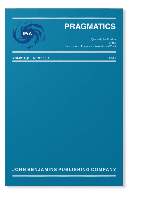
Pragmatics
Advancing interdisciplinary insights in pragmatics.Pragmatics is a premier international journal dedicated to the exploration and development of the field of pragmatics, published by John Benjamins Publishing Co. This esteemed journal, with an ISSN of 1018-2101 and E-ISSN 2406-4238, offers a vital platform for interdisciplinary research in linguistics, philosophy, and social sciences, making significant contributions to scholarly discourse since its convergence in 2005. Recognized for its high-impact research, Pragmatics boasts a prestigious Q1 ranking in both Linguistics and Language and Philosophy as of 2023, with impressive Scopus rankings that place it in the top percentiles of its categories. The journal aims to enhance understanding of communication in diverse contexts and encourages submissions that reflect innovative theoretical perspectives and empirical findings. Although not an open-access journal, it is essential for researchers, professionals, and students seeking to stay at the forefront of pragmatic studies and related disciplines. With its base in Belgium and an address in Amsterdam, Pragmatics continues to influence global conversations in the humanities and social sciences.
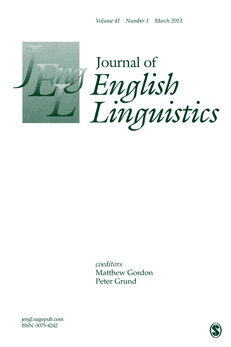
JOURNAL OF ENGLISH LINGUISTICS
Connecting Researchers to the Heart of Linguistic StudyJOURNAL OF ENGLISH LINGUISTICS, published by SAGE PUBLICATIONS INC in the United Kingdom, is a premier scholarly journal dedicated to advancing the field of linguistics through a rigorous exploration of the English language. With its ISSN 0075-4242 and E-ISSN 1552-5457, this quarterly journal boasts an impressive impact factor and maintains a notable standing within the academic community, evidenced by its Q1 ranking in Linguistics and Language. Its rich history, covering publications from 1967 to 2024, ensures that it remains an essential resource for researchers, professionals, and students alike, fostering critical discourse and innovative research in English linguistics. While the journal is not open access, it offers a wealth of valuable insights and cutting-edge findings that are vital for anyone interested in understanding the complexities of language structure, usage, and evolution. For those seeking to stay at the forefront of linguistic scholarship, JOURNAL OF ENGLISH LINGUISTICS represents an indispensable cornerstone in the field.

Italian Journal of Linguistics
Advancing linguistic insights for a global audience.Italian Journal of Linguistics is a prominent academic journal published by PACINI EDITORE, dedicated to advancing the understanding of linguistic theory and application. With its inception in 1996, the journal has fostered scholarly discourse and continues to contribute to the field through rigorous peer-reviewed articles. Operating under the prestigious field of linguistics, the journal currently holds a respectable Q3 quartile ranking as of 2023, showcasing its relevance in the academic community. It also ranks in the top 30% of journals in both Arts and Humanities and Social Sciences disciplines, reflecting its impactful contributions documented in Scopus rankings. While the Italian Journal of Linguistics is not an open-access journal, it offers invaluable insights and innovative research findings, making it an essential resource for researchers, professionals, and students keen on exploring the nuances of language and linguistics. Based in Pisa, Italy, the journal serves as a significant platform for both contemporary studies and classic investigations in linguistics, appealing to an international audience devoted to this ever-evolving field.